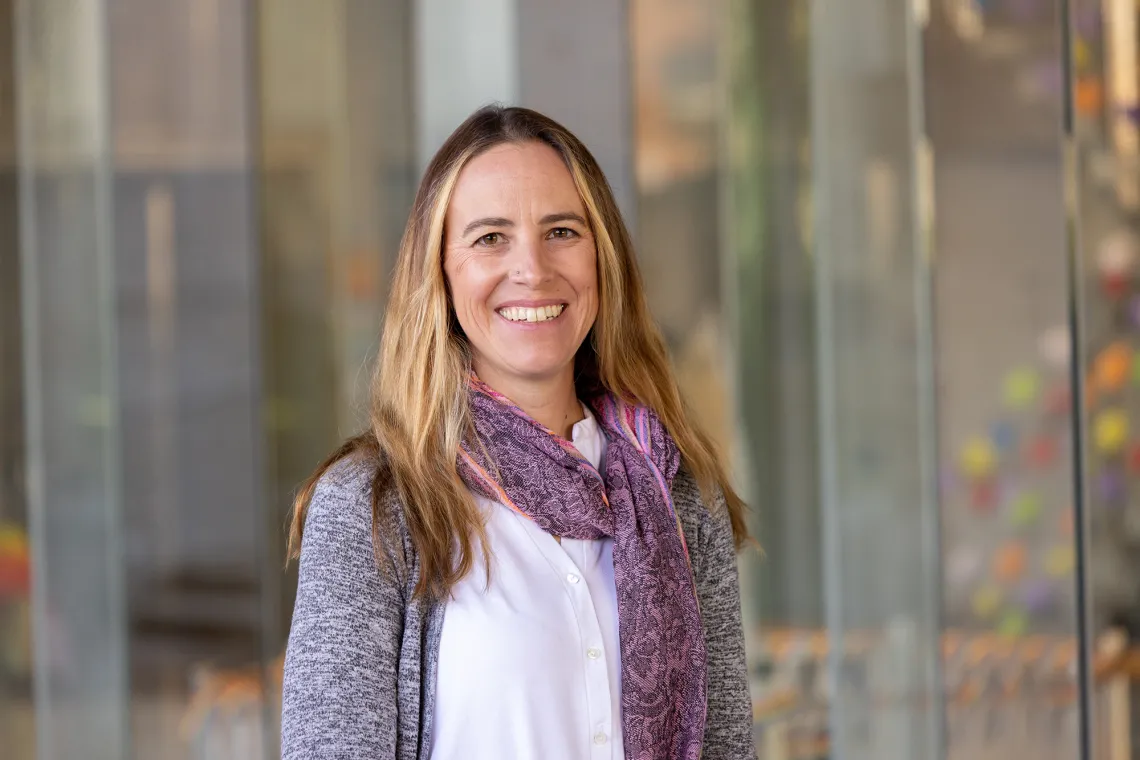Science Gives Me Hope
UArizona paleoclimatologist receives NSF’s highest early-career honor

When Jessica Tierney enrolled in an introductory geology course in college, it sparked her interest in Earth Science, and soon she embarked on a path to studying ancient climates.
“Studying the past is important because it can narrow our projections for what climate will look like at the end of the century, and what sort of impacts humans will face,” she says. Using novel modeling techniques combined with paleoclimate data assimilation, she has generated groundbreaking maps of past climate conditions and the system dynamics that produced the conditions. Her research has redefined the understanding of global temperature changes in the geologic past and developed a new quantitative understanding of temperature and climate sensitivity to past levels of carbon dioxide.
Tierney is an associate professor in the Department of Geosciences in the College of Science. In May, she became the first climatologist and the first UArizona researcher to win the National Science Foundation Alan T. Waterman Award. Tierney is one of three recipients nationwide who will each receive $1 million over five years to advance their research.
Tierney’s research focuses on understanding ancient climate change, including quantifying changes in global temperature, ocean temperature and the water cycle. The goal is to improve our understanding of what the future holds under climate change. She specializes in generating organic geochemical records of paleoclimate, derived from fossil molecules known as biomarkers that are preserved in sediments and rocks.
“The funding from this award will provide key support for my students, postdocs and my lab manager, bolstering our ability to explore new research avenues,” Tierney says. “In particular, this award will allow us to explore high-risk, high-reward ideas that have the potential to transform our understanding of past and future climate change.”
Tierney Connects the Past, Present and Future — Concerns and Hopes for Managing Climate Change
Q: What is the focus of your climate research?
A: My research focuses on understanding climate change in the geological past, so that we can better prepare for the future. Studying past climate change is important, because humans have already raised carbon dioxide levels well above anything seen in documented history, so our short observational record of climate can’t tell us what the Earth does when greenhouse gasses are high. We have to go back over 2 million years to find the last time that carbon dioxide levels were this high. Ancient warm climates in particular are helpful, because by studying how the patterns of ocean temperature and rainfall changed during these times, we can better predict what might happen by the end of the century. But how do we study these old climates? Obviously, we don’t have a time machine, so we have to rely on clues written in natural archives of climate change. In my lab, we analyze the organic chemical properties of sediments deposited in the deep ocean or in lake basins on land. We have techniques that can tell us how hot or cold or how wet or dry it was. By putting this information together with climate model simulations, we can get a good view of how the Earth’s climate behaved.
Q: What originally got you excited or worried about climate issues, and where do you think your work can make a difference?
A: I got into studying past climates because of my interest in history, and how the study of the past informs our social, political and economic behavior today. Similarly, the Earth’s history tells us how the climate system will react in the upcoming decades. However, despite knowing how the Earth can reconfigure itself in warm climates, I was shocked when, in summer of 2021, we saw a series of extreme climate and weather events including heat waves, megafires, record-breaking flood events and powerful hurricanes. For the first time, I felt like, “Wow, this is really happening!” The latest IPCC report has, for the first time, linked extreme events like these to human-caused climate change. It got me thinking about how little we know about extreme events in the past. Because climate extremes happen over days, they are hard to reconstruct from the geological record. However, there are some special archives that capture ancient flood events, for example, and computational power has gone up to the point where we can simulate ancient climates at higher spatial and temporal resolution than ever before. I’m interested in this challenge of understanding paleoweather, which would directly connect to climate changes that are happening to people all around the world, right now.
Q: What’s one thing you want everyone to understand about climate change?
A: I want to encourage everyone to stay hopeful. Climate change is a huge challenge to address, and it can be overwhelming to process that and also figure out where you fit in. However, humans got us into this, and we can get ourselves out of it as well. There is a lot of talk in the media about warming levels, like 1.5 degrees Celsius for example, and many people are worried about what happens if we pass those. It is important to know that there isn’t a single threshold out there beyond which there is no point of return. Things get incrementally worse as you keep warming, but we can stop at any time and avoid the worst case scenarios. The problem ultimately has to be addressed at a community and government level, but as an individual there are a lot of things you can do, like get involved in local efforts to improve access to renewable energy – like community solar projects – or public transportation. It’s also important to vote, so that candidates – from local to national – that have climate change on their agenda are in positions of power. We definitely have the technology to limit climate change, so I’m optimistic. Science gives me hope.
